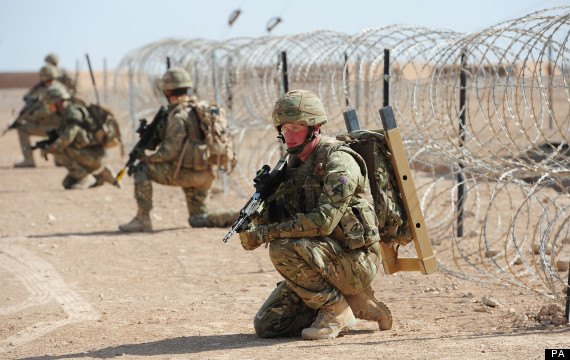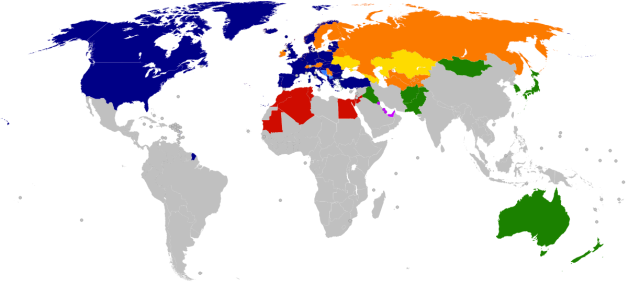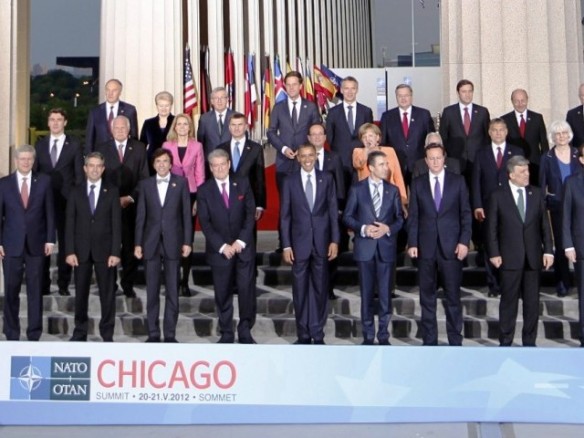Les opérations militaires de l’OTAN
Trois opérations militaires plus connues de l’OTAN sont:la dislocation de la Yougoslavie, la guerre du Kosovo et la guerre de l’Afghanistan.
1. La dislocation de la Yougoslavie
La dislocation de la Yougoslavie a eu lieu à la fin de la guerre froide. À cause de la détérioration de la situation, le Conseil des Nations Unies a décidé le 9 octobre 1992 de créer une zone d’exclusion aérienne au centre de la Bosnie-Herzégovine.
L’OTAN a appliqué cette décision et a commencé l’opération Deny Flight. L’OTAN s’est aussi engagée dans une opération de surveillance maritime, Opération Sharp Guard. Le 28 février 1994, l’OTAN a abattu quatre avions serbes de Bosnie qui avaient violé la zone d’exclusion aérienne. Cet incident était la première action de guerre. Plus tard, pour protéger Goražde, la zone de sécurité, il y a eu le bombardement d’un poste de commandement militaire des Serbes de Bosnie près de Goražde. Par conséquent, 150 membres du personnel ont été pris en otages. En réponse, l’OTAN a commencé une campagne de bombardement qui a duré deux semaines et donc, l’OTAN a contribué à la fin des guerres yougoslaves en novembre 1995.
2. La guerre du Kosovo
L’OTAN a créé l’opération Allied Force avec 43 000 hommes après l’incident de Račak. L’incident de Račak est le massacre de 45 albanais du Kosovo à cause des tensions entre les Albanais et les Serbes.
La campagne aérienne a duré 78 jours et était composée de 36475 sorties aériennes (480 par jour en moyenne) qui ont provoqué la capitulation de la République Fédérale de Yougoslavie. Pendant cette guerre, l’organisation non-gouvernementale, Human Rights Watch, a identifié 90 incidents qui ont causé la mort d’environ 500 civils. Bien que l’OTAN ait défendu ces incidents en utilisant “le concept de dommage collatéral”, cette situation a représenté une violation du droit international humanitaire par l’OTAN.
3. La guerre du Afghanistan
On va discuter de cette opération militaire dans la discussion lors notre visite du quartier général de l’OTAN.
Notre visite du quartier général de l’OTAN
As future scientists and researchers, one thing that we usually find ourselves doing is to ignore politics, especially in countries other than the United States. The trip to NATO in Brussels has definitely taught us a lot about the common misinterpretation of the US’s role on the international stage.
The day began with a talk by Mr Richard Willams on NATO, its role and some important past and current events. We then had the chance to visit NATO’s political headquarters in Belgium and also discussed with two NATO officials regarding NATO’s function and the situation in Afghanistan specifically.
The information I gathered from both talks is very eye-opening in many ways. L’OTAN, or L’Organisation du traité de l’Atlantique Nord responds to reality in the international security environment. L’OTAN was strongly emphasized, by both Mr. Richard Williams and two NATO officials who talked to us, as a political and military organization. NATO is responsible for bringing nations across the Atlantics into a dialogue regarding their individual and overall security. After an appropriate assessment of the current situation of security, NATO will decide on whether it’s necessary to take defensive or pre-emptive actions to preserve the security of the member nations
Many have mistakenly thought that USA is the only military force in the current situation in Afghanistan or NATO is controlled completely by the US. Contrary to popular belief, the decision made by NATO is based on consensus: a member can only advocate, not decide.
USA, however, is more prominently mentioned in the media when military operations are discussed because of its military power, as well as the financial contribution it has made to the organization. The role of the US is even more prominent especially when new missions that require new capabilities can only be done by the US’s army, for example: strategic lift and air-to-air refilling of fuel (that enables the ability to transport troops and weapons over long distances).
The attacks of September 11th marks the first time Article 5 in the NATO agreement was violated. The incident also marks the first time NATO is involved in matters outside the European/US border. At the beginning of this mission, the main role of NATO is to greatly weaken the capacity of al-Qaeda to export terrorism. After more than a decade of military operation in Afghanistan, the power of al-Qaeda has been significantly weakened. Consequently, NATO now has to pave way for transition by putting the Afghanistan citizens in the center of the discussion and train the indigenous population how to strengthen their military forces so insurgents and al-Qaeda can be suppressed or even eliminated by the national army, without intervention from foreign countries. The withdrawal of NATO troops from Afghanistan is also what the people of Afghanistan want.
At the recent NATO summit in Chicago, all NATO nations have come together to assess the situation in Afghanistan and agreed to say “Yes” to Afghanistan’s request for continuation of military aid and institutional development of the police and army forces. The ultimate goal is that in 2014, Afghanistan can survive and defend itself when troops are mostly withdrawn from the country. Obama has said in the summit that the Afghanistan people will not be abandoned, they will be in a state stable enough after a decade of war. Therefore, NATO member nations have also agreed that tax dollars, personnel and political capital will also be supplied to Afghanistan in order to help them stand on their feet. In total, 16 billions dollars has been pledged to the recovering post-war Afghanistan.
With the Afghanistan’s election in 2014 and the current political corruption present here, the country has a lot of work to do. Afghanistan has also signed a mutual Accountability Agreement, which means that: even though one can’t expect radical changes overnight (for example wiping out corruption), Afghanistan is expected to reach a certain level of independence by improving integrity of governmental organizations, creating more transparency and freedom of press in the country, in order to significantly reduce corruption (which can create the vicious cycle of foreign financial aids funneled into pockets of government officials, instead of into rebuilding the vulnerable nation)
Questioned have been raised about what will happen if Afghanistan eventually falls apart if corruption can’t be curbed, President Obama signaled that a responsible and sound plan has been put in place for Afghanistan, the rest is dependent on the nation as a whole.
British Prime Minister David Cameron has summed up well in the summit that: “The message to the Afghan people is that we will not desert them. And the message to the insurgency is equally clear: You cannot win on the battlefield. You should stop fighting and start talking.”






